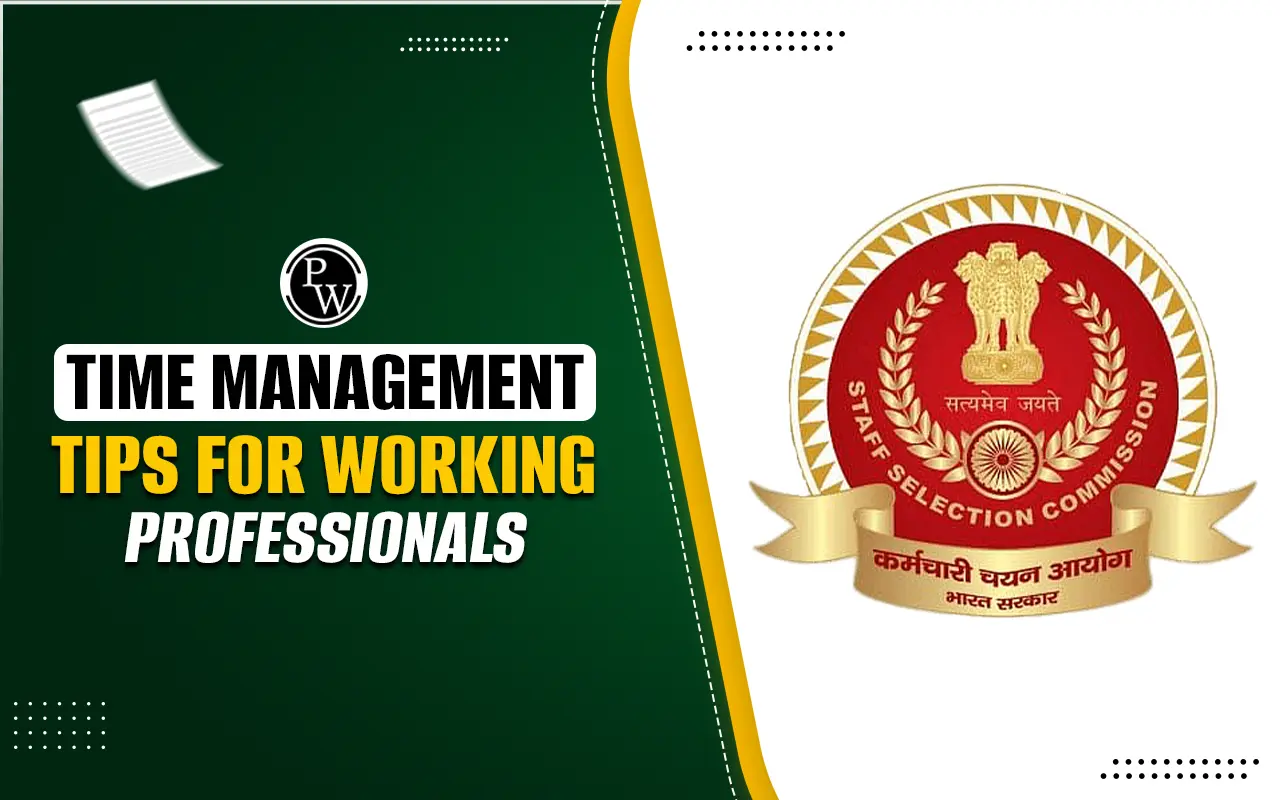

Time Management Tips to Clear SSC Exam for Working Professionals: Balancing a full-time job while preparing for SSC exams can be challenging. Preparing for the SSC exams while working demands commitment and discipline. With 9-hour workdays and commutes, finding time to eat or sleep is tough. However, aspirants must optimize their time to squeeze out at least 4 hours daily for focused study. Check Time Management Tips to Clear SSC Exam for Working Professionals in this article.
Time Management Tips to Clear SSC Exam for Working Professionals
Time Management Tips to Clear SSC Exam for Working Professionals are as follows:Create a Realistic Study Schedule
Plan Your Day: Having a well-structured daily routine can make a significant difference. By allocating specific time slots for studying, working, and personal activities, you can ensure that each aspect of your life gets the attention it deserves.
Set Realistic Goals: Break down your syllabus into smaller, manageable sections and set daily or weekly goals. For instance, if you plan to cover a certain topic in Quantitative Aptitude, ensure it is feasible within the time you have allocated.
Morning Study Time: We recommend getting up early in the morning and studying for at least 2 hours. Since most jobs begin at 10 a.m., rise between 4:30 and 5:30 a.m. to ensure at least two hours of study. Focus on practicing English Comprehension and studying General Awareness during this time. This is the best time to learn new things as it stays in the memory for a longer period.
Evening Study Time: Dedication is essential to achieve the desired results. Make it a habit not to sleep without studying. After finishing work around 7 p.m., devote two hours to studying, from 9 p.m. to 11 p.m. Use this time to study reasoning and quantitative aptitude.
Weekends: Weekends are a gift for your planning. Make a weekly plan and finish 3-4 topics from the SSC Exam syllabus. These topics must be prepared in such a way that you can efficiently grasp all of the related concepts and ensure that you will not need to revise them in the future.
What Should You Follow?
Identify Key Areas: Focus on the most critical parts of the syllabus first. For example, if you find General Awareness challenging, dedicate more time to it.
Use the Eisenhower Matrix: This matrix helps in prioritizing tasks based on urgency and importance:
| Urgency\Importance | Important | Not Important |
|---|---|---|
| Urgent | Do immediately | Delegate if possible |
| Not Urgent | Schedule to do later | Eliminate or minimize |
Weekend Coaching Classes: Due to changes in the SSC examination pattern, competition has increased, and the level of the question paper has also changed. Preparing study notes, collecting practice material, learning shortcut tricks, building concepts, and clearing doubts is extremely difficult while working full-time. Therefore, attending coaching classes on weekends and weekdays, if possible, is recommended. Candidates can join PW for getting correct guidance regarding SSC Exams.
Prepare Scoring Topics First: As a working professional, it's advisable to focus on the most scoring subjects and topics to gain maximum marks with minimal effort. In the Quant section, Mensuration, Algebra, Trigonometry, and Geometry are high-scoring topics, often appearing in many questions and requiring significant time to solve. Other priorities include profit and loss, simple and compound interest, and time and work, which are simpler and quicker to solve. Learn shortcut techniques to save time for other sections.
Every chapter in the Quant section includes questions that are regularly repeated. You might be considering shortcuts for other sections now. However, we want to clarify that shortcuts for other sections require extensive research. Identify the frequently asked questions and practice thoroughly.Positive Approach: Don't let internal and external factors demotivate you. Always stay upbeat and cheerful during your preparation. If you feel stressed or tired, remain calm and focus on your goal. Internal factors like other career options, poor health, or academic records often cause distractions. Stay focused and motivated despite these challenges.
Make Use of Breaks
Private sector jobs are often hectic and time-consuming. Therefore, it’s important to assess your job's nature and identify any available free time, such as during lunch breaks, coffee breaks, or downtime between events. To make the most of this valuable time, consider using apps like PW. These apps offer a range of test materials from easy to difficult, allowing you to complete two quizzes on different topics in about 30 minutes. They are accessible during travel or while sitting anywhere, making them ideal for focusing on English practice during these moments.Efficient Study Methods
Active Learning: Engage in active learning techniques such as summarizing information, teaching concepts to others, or practicing with mock tests. These methods enhance understanding and retention.
Digital Resources: Leverage digital resources like online courses, educational apps, and videos, which can be accessed during commutes or short breaks provided by PW.
Minimize Distractions
Dedicated Study Space: Set up a dedicated distraction free study area. Ensure it is quiet, well-lit, and equipped with all necessary materials.
Limit Social Media: Use apps that block or restrict access to distracting websites during study hours to maintain focus.
Maintain a Healthy Lifestyle
Regular Exercise: Incorporate physical activity into your routine.
Healthy Diet: Eat a balanced diet. Avoid excessive caffeine and junk food.
Adequate Sleep: Ensure to get 7-8 hours of sleep. Sleep is crucial for cognitive function & productivity.
Leverage Weekends and Holidays
Intensive Study Sessions: Use weekends & holidays for longer study sessions. Plan to cover more material during these periods.
Review and Revise: Use this time to review and revise what you have studied during the week to reinforce learning.
Stay Motivated and Positive
Set Milestones: Set short-term milestones and reward yourself when you achieve them.
Positive Attitude: Stay positive and believe in your ability to balance work and study. Remember, with consistent effort and a disciplined approach, success is within reach.
Sample Weekly Study Plan
Candidates can refer to the Sample Weekly Study Plan for the candidates who are aspiring to clear SSC Exams in 2024.| Sample Weekly Study Plan | |||
|---|---|---|---|
| Day | Morning | Evening | Notes |
| Monday | Quantitative Aptitude | General Awareness | Review previous topics |
| Tuesday | Reasoning | English Language | Practice mock tests |
| Wednesday | General Awareness | Quantitative Aptitude | Focus on weak areas |
| Thursday | English Language | Reasoning | Review study notes |
| Friday | Quantitative Aptitude | General Awareness | Go through current affairs |
| Saturday | Full Mock Test | Analyze Mock Test Results | Identify areas for improvement |
| Sunday | Review & Revision | Intensive Study Session | Cover missed topics and practice questions |
Time Management Tips to Clear SSC Exam for Working Professionals<span style=
How can I manage study time with a full-time job?
How can I use my commute for SSC exam preparation?
What should I focus on during weekend study sessions?
How can I stay motivated while balancing work and SSC exam prep?












